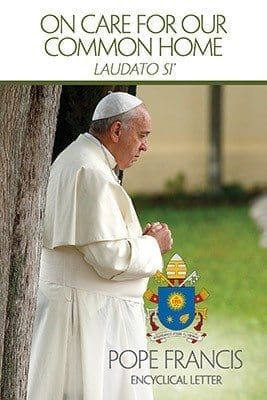Atlanta
Archbishop to priests: ‘Laudato Si’’ calls for renewed relationship with God, others, creation
By ANDREW NELSON, Staff writer | Published December 10, 2015
ATLANTA—Pundits and business interests question why the pope is getting involved in the debate over climate change and environmental destruction, Archbishop Wilton D. Gregory told priests serving in Georgia, but that reaction occurs whenever church leaders raise moral questions about current events.
Pope Francis’ environmental encyclical is “written to the entire world,” Archbishop Gregory said. “The issues impact all of us.”
The archbishop spoke on the encyclical “Laudato Si’: On Care for Our Common Home,” as the theme for an Advent day of reflection with local priests. Nearly 80 priests took part in the prayer, discussion and lunch held at the Cathedral of Christ the King on Tuesday, Dec. 1.
Pope Francis charges everyone to take seriously the care of the environment, viewing it as an “integral ecology” which ties together the relationship with God, care for other people, and the environment.
“We can’t do piecemeal ecology,” Archbishop Gregory said.
The papal document highlights how the poor often suffer from environmental destruction first, he said. People living in the developed world can turn to bottled water if waterways are polluted, while the poor in the Third World face bathing in and drinking polluted water, he noted.
Archbishop Gregory rooted the document in the church’s social justice tradition, beginning with “Rerum Novarum” (“Of Revolutionary Change”) issued in 1891 by Pope Leo XIII. That papal document focused on abuses faced by the working class during the Industrial Revolution and put the church’s moral voice on the side of workers’ rights.
Pope Francis does not treat abortion and other threats to human life as stand-alone issues but places them within the category of caring for all people, from those in the womb to the most vulnerable elderly, said Archbishop Gregory.
And “Laudato Si’” isn’t intended to settle a scientific controversy but to encourage “honest and open debate,” he said. He said Pope Francis is concerned private interests prejudice the science and the policy debate over the environment without allowing all voices, particularly those of the poor, to be heard.
Priests offered their own thoughts on how to convey the message of “Laudato Si’” to parishioners.
Education needed on encyclical
Msgr. Hugh Marren, pastor of All Saints Church, Dunwoody, said the world community should consider compensating countries that preserve important natural resources, such as the Amazon River and rain forest.
According to the Rainforest Foundation, rain forests maintain global rainfall and regulate climate patterns worldwide. They also store large amounts of carbon in their vegetation, which is released as carbon dioxide into the air if the vegetation is cut down.
“We are all in horrible shape” if there aren’t incentives given to these countries to preserve the region rather than deforest it, Msgr. Marren said.
La Salette Father Joe Gosselin said indigenous communities consider natural resources something to be handed on to future generations. In the contemporary business climate, there is too often only a short-term view, he said. The encyclical isn’t promoting a quick fix to the complex issue.
“This is a timeline that is over generations,” he said.
Father Gosselin said he would like the church to focus on educating people, to ensure Catholics understand why respect for the physical environment is important and how this ties into their faith.
“Reflection and action to me is so important,” he said.
The Atlanta Archdiocese is promoting the message of the encyclical in collaboration with Georgia scientists. Together they released in November an action plan as a way for individuals, families and parishes to develop earth-friendly practices. The archdiocese also has taken to social media to promote environmental awareness with the hashtag: #Refreshatl.
The 38-page action plan brings together the consensus of scientific thought on climate change to inspire individual Catholics and parishes in the Atlanta Archdiocese.
The report lists categories of concern including: energy efficiency and conservation; recycling; transportation; water use; buying and sharing food; sustainable landscapes; helping those in the congregation most impacted by extreme weather changes; practical ways to inform and engage young people in the message of the encyclical; and political action.
Each category includes suggested actions, ranked from the easiest, such as shopping with reusable bags, to moderate and advanced changes, such as installing an electric car charging station on parish or school grounds.
Georgia is “blessed with abundant natural resources,” the report says, including “rich biodiversity” in the north Georgia mountains and one-third of all of the remaining salt marshes on the U.S. East Coast. But the state isn’t immune to the situation, with rising sea levels affecting coastal cities. Georgia farmers will have to contend with hotter temperatures and fewer cool days as crops are planted. The Atlanta area faces an increased chance of flooding.
